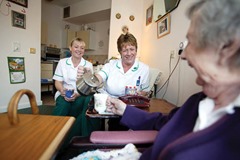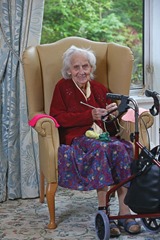TYC: caring for older people
 Four years on from the Transforming Your Care (TYC) review, the Health and Social Care Board continues to emphasise the importance of alternatives to institutional care and the maintenance of high standards in acute care for older people.
Four years on from the Transforming Your Care (TYC) review, the Health and Social Care Board continues to emphasise the importance of alternatives to institutional care and the maintenance of high standards in acute care for older people.
In 2015-2016, the Transforming Your Care programme will receive a planned investment of £15.6 million to fund initiatives which care for older people. To date, £25 million of transitional funding has been channelled into service developments within this area.
The annual departmental review of domiciliary care provision, published in February, highlights a reduction of 1,000 people receiving the service. However, there has been no decrease in the volume of domiciliary care provision. On average those who get the service have received it for more time (up from 9.8 hours during the 2013 survey week to 10.4 hours in 2014). The Health and Social Care Board emphasises that these figures must be observed in a wider context. It maintains that a renewed emphasis on supporting carers and helping people procure their own support has enabled the Health Service to refocus on individuals who require more care.
Within its overall strategy for the care of older people, the board aims to promote healthy lifestyles to ensure that as many people as possible can continue to live in their own homes. For those with frailties, disabilities or impaired cognitive abilities, an additional level of domiciliary support, day care or community nursing may be required to facilitate this alternative to institutional care.
Residential care has undergone a significant transformation over the last decade, especially within the statutory sector. As a consequence, there has been a reduction in overall capacity – largely due to the development of home-based support and the emergence of more appropriate accommodation. The Cedar Court supported living scheme in Downpatrick is one such example. Structured to ensure that tenants retain their independence, the development provides homes with 24 hours-a-day support and assistance.
The Health and Social Care Board has, over the last year, conducted a review into the future function of the remaining statutory care homes. Out of this process, which included a public consultation, the board has produced a series of recommendations for change. This report is currently being considered by the Department of Health, Social Services and Public Safety.
 In the last year, health and social care providers from across the sector have reviewed the planning and delivery of services for older people and those with long-term conditions. Conducted through integrated care partnerships (ICPs), this process considered how services could be improved and better co-ordinated. The ICPs have produced a series of proposals which have been agreed by local commissioning groups and are now at staggered stages of implementation. Over the next year, there will be an implementation of an ‘acute care at home’ model across the region, a falls prevention pilot programme in the South Eastern area, the expansion of a rapid response service for older people in the Southern area, and a pilot service to improve care for older people after discharge from hospital in the Western area.
In the last year, health and social care providers from across the sector have reviewed the planning and delivery of services for older people and those with long-term conditions. Conducted through integrated care partnerships (ICPs), this process considered how services could be improved and better co-ordinated. The ICPs have produced a series of proposals which have been agreed by local commissioning groups and are now at staggered stages of implementation. Over the next year, there will be an implementation of an ‘acute care at home’ model across the region, a falls prevention pilot programme in the South Eastern area, the expansion of a rapid response service for older people in the Southern area, and a pilot service to improve care for older people after discharge from hospital in the Western area.
Speaking on behalf of district nurses, Royal College of Nursing Chair Fiona Devlin has stated: “Patients say they want to be cared for at home and we support that. But to do that, we need to be supported and that means we need resources.” Noting rising demand, she added: “Everything that Transforming Your Care said was to happen, has to happen, if community care is going to be realistic.” Meanwhile, BMA general practice spokesman Tom Black has commented: “While GPs signed up to TYC as a tangible means to improve care, they are bitterly disappointed at the failure of TYC to achieve what it set out to do, which included focusing on an individual’s care and delivering care close to home.” Black added:
“It is not enough to say that there is no money. The health budget is in excess of £4 billion. The money that we do have needs to be spent wisely on out-of-hospital initiatives that will make a difference to our patients.”
Benefits from technology
Technological innovation within the Health Service is particularly beneficial for older people who require the most treatment and care. The introduction of the Northern Ireland Electronic Care Record has enabled healthcare professionals to gain immediate access to important information, such as laboratory and radiology records, drug and allergy histories, and appointment timetables. Access to this information increases efficiency by reducing the need for repeat tests and helping doctors and other healthcare professionals to make swift and informed medical decisions.
Meanwhile, the Telemonitoring NI service is helping people to manage their own long-term conditions. The renal telemonitoring service, for example, is reducing the volume of hospital admissions and GP visits by patients who can now read their own blood pressure and have results automatically uploaded to the monitoring centre where they can be viewed by a renal nurse specialist. Video conferencing, facilitated by European funding, has also been deployed in the speech and language rehabilitation process for stroke





